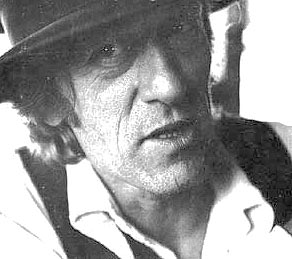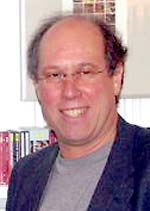
Edward Dorn (1929–1999) wrote poetry, fiction, non-fiction, journalism, and translations, all from a position outside the centers of power of our time but close enough to see them clearly and to indict their control over our lives. This same position — that of the outsider able to see into the heart of the contemporary world — has been occupied by some of the most incisive and persistently valuable critics of American culture, such as Henry David Thoreau, Mark Twain, Ralph Ellison, and Charles Olson.

Edward Dorn
Like these writers, Dorn takes as the central obligation of a citizen’s life the task of finding out exactly where one stands — geographically, politically, and spiritually — in order to maintain a critical distance from coercive institutions and to honor the integrity of one’s own sense of things. “The Cosmology of Finding Your Place” (title of a poem he presented in 1969 to the Draft Resisters League in Lawrence, Kansas) requires an investigation of all the particulars involved in establishing one’s location: the imprint of the physical geography, the imperatives of the nation-state, the manipulations of the commercial and media powers, and the data supplied by one’s own desires and abhorrences.
Born in Illinois, Dorn grew up in the Depression in a family of itinerant farmers. He attended the University of Illinois and graduated from Black Mountain College in North Carolina, where he joined a community of writers including Charles Olson, Robert Creeley, John Wieners, and Fielding Dawson. In A Bibliography on America for Ed Dorn, Olson lays out the premises and the methodology for the geographically, politically, and historically engaged poetry that he and the young Dorn would pursue. While Olson grounded his poetic investigations in the fishing port of Gloucester, Massachusetts, his student mined the more extensive territory of the Western United States. Olson directs the serious poet/historian to reject hearsay and cliché and to find out the facts for herself. Seek “PRIMARY DOCUMENTS,” Olson counsels Dorn: “And to hook on here is a lifetime of assiduity. Best thing to do is to dig one thing or place or man until you yourself know more abt that than is possible to any other man.”
Like Olson, Dorn was acutely aware of the extent to which the information that reaches us is nearly all hearsay, controlled and manipulated by various institutions and media, and he learned to trust only statements that arose from individual “digging.” While interviewing Dorn in San Francisco in 1977, I witnessed a practical illustration of his habit of trusting individuals over institutions: the bookshelves in his study were laden with titles on the widest variety of subjects imaginable, arranged not according to topics but all in a single alphabetical order by author. Dorn cared more about the writer and his or her responsibility to the material than about the illusion of “covering” a subject like geography or physics or economics.
A statement he made to a class at the Naropa Institute in Boulder, Colorado, reinforces the point. He was so emphatic about the need to find out the facts for oneself that he wouldn’t accept even a dictionary as authoritative, including the classic Skeat’s dictionary of etymologies for the English language. “Mr. Walter William Skeat compiled the big etymological dictionary,” he said. “But that too simply provides a summary of where the root is. You certainly don’t get the network or the grid of what it is. You get a summary of someone else’s exploration . . . It’s not necessarily the root, but it’s one ‘authority.’ This same phenomenon operates all over the place, in almost everything: the acceptance of truth as authority. Authority simply being the summation of somebody’s opinion of what authority is.” Like one of his heroes, Samuel Johnson, the great eighteenth-century exposer of cant and author of the first major English dictionary, Dorn remained conscious that a “reference” book, like any other product of human intelligence, rests on the authority of decisions for which individuals must take personal responsibility.
His writing can be compared fruitfully to the acute social criticism of British poets like Johnson, Swift, Blake, and Byron. Like many poets in the U.S., he adopts these influences to the particularly American strain of rebellion and distrust of authority. In this he resembles intriguingly Bob Dylan among writers of the last century, for both he and Dylan identify with loners and resisters and those who look into mysteries for themselves. In the new millennium, artists willing to confront overbearing institutions and authorities and to head off in original directions seem in short supply. Rather than poets like Dorn and Dylan who speak out on public issues with self-assurance and a personal vision, so many artists seem unable or unwilling to stand on their own, frozen in place by the incandescent glare of techno-media consumerism. Dorn analyzed this reigning behemoth of social, economic, political, and religious control with great perspicuity throughout his career, speaking from a standpoint of fierce independence that he characterized as “The Protestant View”:
that eternal dissent
and the ravages of
faction are preferable
to the voluntary
servitude of blind
obedience
The path of the individualist and self-proclaimed heretic (in regard to contemporary orthodoxies) is lonely and difficult and unpredictable. In one of his final books, Languedoc Variorum, Dorn mounts an explicit “Defense of Heresy and Heretics,” tying incidents from the Albigensian Crusade against the Cathars together with religious, political, and popular cultural events from our time, showing a culture once again at the mercy of fanatical enforcers of orthodoxy. With remarkable consistency throughout his writing career, he celebrated the risks of insecurity and self-reliance, delivering a timely jeremiad for an era governed by fear and the search for “security.”
Dorn also joins Dylan in rejecting the categorizing of individual thoughts and behaviors into conventional definitions. Both feel that “definition” is society’s attempt to control the wayward individual and to suck the marrow from his or her unruly life. In one of the many interviews in which he mainly avoids attempts to define him and his music, Dylan remarks, “Greed and lust I understand, but I can’t understand the values of definition and confinement. Definition destroys.” Dorn excoriates “definition” in a central scene of his comic epic, Gunslinger. The Gunslinger’s talking horse has been sitting at a table holding forth while rolling marijuana cigarettes. “A stranger” finds this behavior outrageous and begins to taunt the horse. To which The Stoned Horse replies:
Stranger you got a pliable lip
you might get yourself described
if you stay on.
When the tension in the scene increases to the point of a showdown, the Gunslinger abruptly leans forward in his chair and his gun unaccountably appears in his hand “in that warp of relativity one sees / in the backward turning spokes / of a buckboard,” pointed at the stranger. Although Lil, the madam of the cabaret, blurts out, “that amacher’s / got the drop on you!,” the Gunslinger assures her his gun has already “described” the man as “a plain, unassorted white citizen.” Another character named “I,” who functions as the ego of the poem, inquires what this gunplay means, evoking a lecture from the Gunslinger on the “mortal” dangers of letting oneself be described:
Nevertheless,
it is dangerous to be named
and makes you mortal.
If you have a name
you can be sold
you can be told
by that name leave, or come
you become, in short
a reference, or if bad luck
is large in your future
you might become an institution
which you will then mistake
for defense. . . .
Please! I implored him
you terrify me.
What then, I asked
is my case? Looking into
the Odd toed ungulate’s eyes
who had his left leg resting on my shoulder.
The mortal can be described
the Gunslinger finished,
That’s all mortality is
in fact.
To be described is to suffer the indignity of being identified with social categories, thus becoming trapped in the bureaucratic, statistical maze that the western world has constructed to keep its population in order. The anxious “mortality” of the described is no match for the Gunslinger or for his outrageous horse, whose disconcerting familiarity causes “I” to completely lose his self-possession. Most pressingly, those being described cannot match the Gunslinger’s mysterious feat of eliminating the draw, for they lack “self containment”:
When the act is
so self contained
and so dazzling in itself
the target then
can disappear
in the heated tension
which is an area between here
and formerly
Self-containment is a Zen-like state that arises from intent concentration on an object so that space (“here”) and time (“formerly”) come together in an “area” of “heated tension.” This total dedication to the moment and the object seems to offer an escape from the categorical falsehood of description and an immersion in a new state of thought.
In his next book, Recollections of Gran Apachería, Dorn presents the Apaches as noble “not in themselves / so much as in their Ideas.” Apache thought, like the Gunslinger’s, arises from dwelling undistractedly in a timeless, local space, defined by actual geographical features: “Their leading ideas / come directly from the landform.” Western culture, in contrast, wants to control everything through the abstract force of predictive reason, which Dorn labels “Mind.” Mind is a deadly tool in the wrong hands, and Dorn distinguishes it from the thinking practices of people who think with the landform:
The Whole European Distinction
The longest continuous run
of external resistance:
the Apache Wars.
Without significant intermission
from the Seventeenth Century onward
can only be attributed to
the superiority of Native
over Alien Thinking.
Yet they had not invented Mind
and as we know
their domain was by Mind over-ridden . . .
An indispensable poet of the West in both senses (the Western United States and western culture), Dorn uses a sharp scalpel to expose its pathological organs and scouts throughout space and time to find resistant individuals and groups who might offer counsel in how to survive the terrible epidemics, both mental and physical, it creates for itself. This makes for a poetry at once theoretically potent, lyrically affecting, and comically outrageous. Cognizant of this unique combination of modes, Dorn states at the beginning of his Collected Poems: “From near the beginning I have known my work to be theoretical in nature and poetic by virtue of its inherent tone.” With a remarkable range of subjects and forms, this meticulously crafted poetry swerves from puncturing hypocrisy to allegorizing science to re-conceiving love both personally and socially.
Not only the subjects but also the readers of his poems find themselves treated with unusual care. Acknowledging a personal responsibility, Dorn took his relationship to readers very seriously, stating in an interview, “My immediate responsibility is to deliver the best product I’m capable of to my readers.” Perspicacious readers have responded in kind — and this includes not only poets. For example, at a conference I overheard the popular novelist Stephen King, who borrowed The Gunslinger as the title for one of his own novels, introduce himself to Dorn as an ardent fan, citing poems and individual lines he regarded as talismans of perfect writing. Another novelist, Thomas McGuane, contends that “Gunslinger is a fundamental American masterpiece.” A trenchant analysis of life in a region (the West), a nation (the U.S.), and a civilization (the West) in the second half of the twentieth century, Gunslinger and the rest of Dorn’s writing provide an unrivalled resource for understanding an epoch and re-conceiving it from the perspective of an original poetic mind.

Stephen Fredman
Stephen Fredman is Professor of English, University of Notre Dame. His books include Poet’s Prose: The Crisis in American Verse (Cambridge, 1983; 1990); The Grounding of American Poetry: Charles Olson and the Emersonian Tradition (Cambridge, 1993); and A Menorah for Athena: Charles Reznikoff and the Jewish Dilemmas of Objectivist Poetry (Chicago, 2001). He recently edited A Concise Companion to Twentieth-Century American Poetry (Blackwell, 2005).